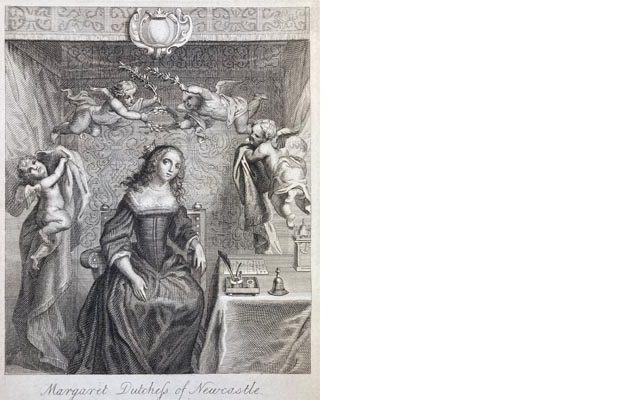
Date/Time
Monday, February 7, 2022
12:00 pm PST – 1:00 pm PST
–presented by Shannon Forest, Ph.D. Student, University of California, Los Angeles
Hosted by the Early Modern Research Group
Online event via Zoom
To register for this event and receive the pre-circulated paper draft, please email the Early Modern Research Group.
In Poems and Fancies (1653), Margaret Cavendish writes: “Motion can’t dilate nor yet contract/ A body which is close, firm, and compact.” If for Cavendish motion depends upon space between things, and if her project is “patterning out” the self-motion of matter, then her poetry’s patterned elements produce a double movement: a contraction of the implicated depth [the conditions for reality, the pre-objective, the unutterable, or what Deleuze calls “the virtual”] that wrests it to the verge of perceptibility, and a dilation that extends it back into the “confusion” from which it emerges. In brief, Cavendish’s poetry enacts, in the mind of the reader, the motions it attempts to map. To attend to the motions of her poetry—a distinctive stratum of her thought irreducible to her philosophy—is to become attuned to the elasticity of her monism and its palpable stakes: a poetics of immanence that finds unexpected but compelling interlocutors in Deleuze and Merleau-Ponty.
This project interfaces with Liza Blake’s digital edition of Poems and Fancies (1653)—one of Cavendish’s neglected, early texts that was not widely available in its entirety prior to 2019. It is therefore among the first to consider the text’s poetics as a matter of serious scholarly interest. Forest suggests that “minor” works by “minor” writers in the period often pursue patterns of thought invisible to a historicist methodology because, as Walter Benjamin tells us, historicism is always of the victor. Reading works that sought to build epistemes that never took root—far territories and their bridges, which have fallen into the abyss of time—demands alternate methods. This project, then, which uses adjacent patterns of thought that emerged most poignantly in the 20th century [especially in phenomenology] to access quanta of the past, may be more broadly relevant to those interested in experimental methodologies.
Shannon Forest is a Ph.D. student in the Department of English at UCLA. Her recent work considers “minor” literatures of the 17th century—and the possibilities of their “irregular” patterns of thought—that interface with ideas traditionally associated with 20th and 21st century philosophy. To these ends, Forest is pursuing the Graduate Certificate in Early Modern Studies, as well as the Experimental Critical Theory Certificate with Professor Ken Reinhard. Her work this year is supported by an Early Modern Certificate Summer Mentorship through the Center for 17th– & 18th-Century Studies and a Graduate Research Mentorship, both under the advisement of Professor Lowell Gallagher. Her work has appeared in The Journal of Modern Literature. She is currently co-editing a volume of the first Complete Works of Margaret Cavendish, which will also issue in an open-access digital edition, in a collective effort to bring Cavendish’s more obscure works to a wider audience.
Image: Frontispiece of Margaret Cavendish, Duchess of Newcastle from the Clark Library’s copy of the 1653 edition of Poems and Fancies.

